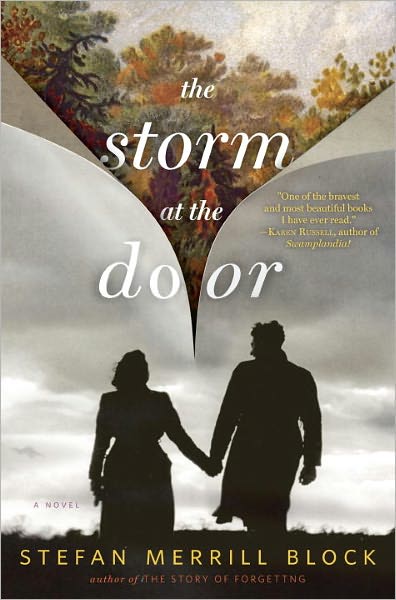

In 1989, Stefan Merrill Block's grandmother burned many of her late husband's letters. She never fully explained her reasons or what those letters contained, and in the years after her death, Block sought to fill in that lacuna in the family history with research and imagination. This decades-long project has finally culminated in the young writer's second novel, The Storm at the Door, in which Block offers a fictional account of one of the most dramatic episodes in his family's history, when his grandfather was committed to the famous McLean Mental Hospital. The Storm at the Door, much like Block's critically acclaimed debut, The Story of Forgetting, is a daring book that crosses the boundaries of genre and time to resurrect a lost past. Early reviewers have described Block's new novel as "This generation's One Flew over the Cuckoo's Nest" (Publishers Weekly) and "a nearly perfect work of art" (Edmund White). I spoke with the 29-year-old author about the literary and real-life inspirations behind his novel, why he wanted to write about his grandparents, and how his lack of journalistic skills paved the way for his remarkable novel.
The Storm at the Door is a novel, and yet it includes many nonfictional elements: actual family photographs, letters, and memories from your own childhood. What compelled you to devise this unusual hybrid structure?
When I decided to write about my grandparents, I originally wanted to write nonfiction. I spoke with everyone I could find who had known them well. Like a domestic Indiana Jones, I spelunked the recesses of my family's attic, in search of lost documents. And I read many books about McLean Hospital, my grandfather's mental institution that was also a home to many of the great poets of the "Confessional" movement of American poetry, such as Robert Lowell, Sylvia Plath, and Anne Sexton.
I thought that, with enough focus and will, I could revive my grandparents' lost history. But, as it turned out, I had too much faith in my journalistic powers. It's true I learned much more about my grandparents, but what I really craved was something that the records and books and even interviews could never deliver: what their lives in that time and place actually felt like. I wanted the little aspects that could animate them in my mind -- the patterns of their speech, the way they touched one another, the minute movements of their thinking. To know my grandparents as I wanted to know them, I saw, would require an act of imagination.
And so, for a time, I thought of this as a purely fictional project, and that understanding gave me enough freedom to allow the intimacy I wanted. But, without the framing of my actual experience, the project felt incomplete. Finally, I understood that the story I was telling was, in no small part, about trying to tell the story. The full story was not just about my grandparents but also about their legacy. So, in the end, the book resembles the process that created it: the nonfictional elements comprise a place of departure into the story I've imagined. Some readers have described this hybrid structure as "experimental," but I certainly never intended it to be that way. I only wanted to tell this story fully. I'm pretty confident that this amalgam of memory and imagination will be familiar to many readers when they think of their own family histories.

Most often, novels about family focus on the relationships between parents and children. But, in The Storm at the Door, your focus is instead on your grandparents. What was it about your grandparents that made you want to write about them?
My grandparents' lives have inspired both of my novels. In both cases, I felt like I had little choice. It's not exactly that I felt I had to write their story; I just felt I had to write, and I couldn't think about moving deeper into my own imagination before I told their story -- or, rather, my story about them. It felt like those family stories were the gates I had to pass through before I could enter more purely imaginative realms.
My grandparents were my first serious fictional characters. My grandfather died long before I was born, and my grandmother died when I was still a kid. My mother home-schooled me; my relationship with her was central in my childhood. Through her, I could feel my grandparents' presence and also the great sadness of their absence. I felt so close to my grandparents, and yet they were gone. I had no choice but to imagine them. And, in the project of that imagination, I came to identify very strongly with both of them.
From my highly unscientific survey of my friends, it seems that this is often the case between grandchildren and grandparents. In families, we often define ourselves in opposition to the people we live with daily. A major part of how we identify ourselves is how we are separate from our parents and our siblings. But grandparents, especially lost grandparents, are at just the perfect distance for profound identification. They share your genetic material and your closest family, but their distance allows you to project yourself into their places. So, I've tried to understand them as they actually were, but undoubtedly my idea of them is also an expression of myself. It is that act of ventriloquism, speaking through a conjured other, that was my first serious fiction project, and how I learned to dream up a character. And that, I think, is why I had to write about them.
Impossible love, genetic inheritance, lost family history, mental illness, the limitations of language: thematically, The Storm at the Door has much in common with your first novel, The Story of Forgetting. But the tone of this new book feels quite different. What made you want to write The Storm at the Door in a much more realist mode?
I think that my first instinct as a fiction writer is to conjure a reality that is slightly elevated or exaggerated. In The Storm at the Door, there are still a few breezes of a slightly fantastical meteorology bearing down on the ordinary world. But, for the most part, the urgency from which I wrote this novel was different from anything I have written before or since. It was a deep and personal need to rescue lost history, to revive, at least in the space of a fiction, my lost family. Even if my grandparents' characters in this novel are mostly products of my imagination, my compulsive need in writing this book was to know my grandparents as I can't in real life. That urgency muted my usual fanciful impulses, which would have just distracted from that singular need.